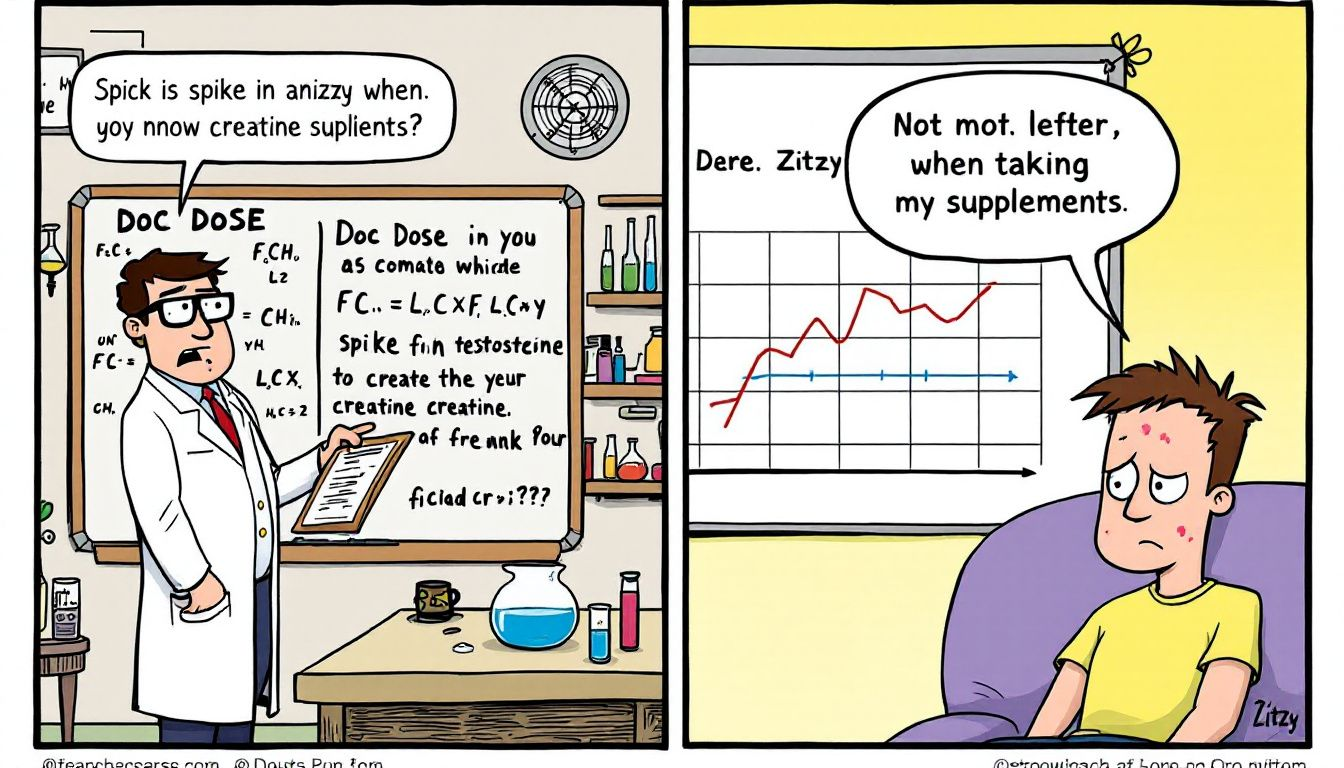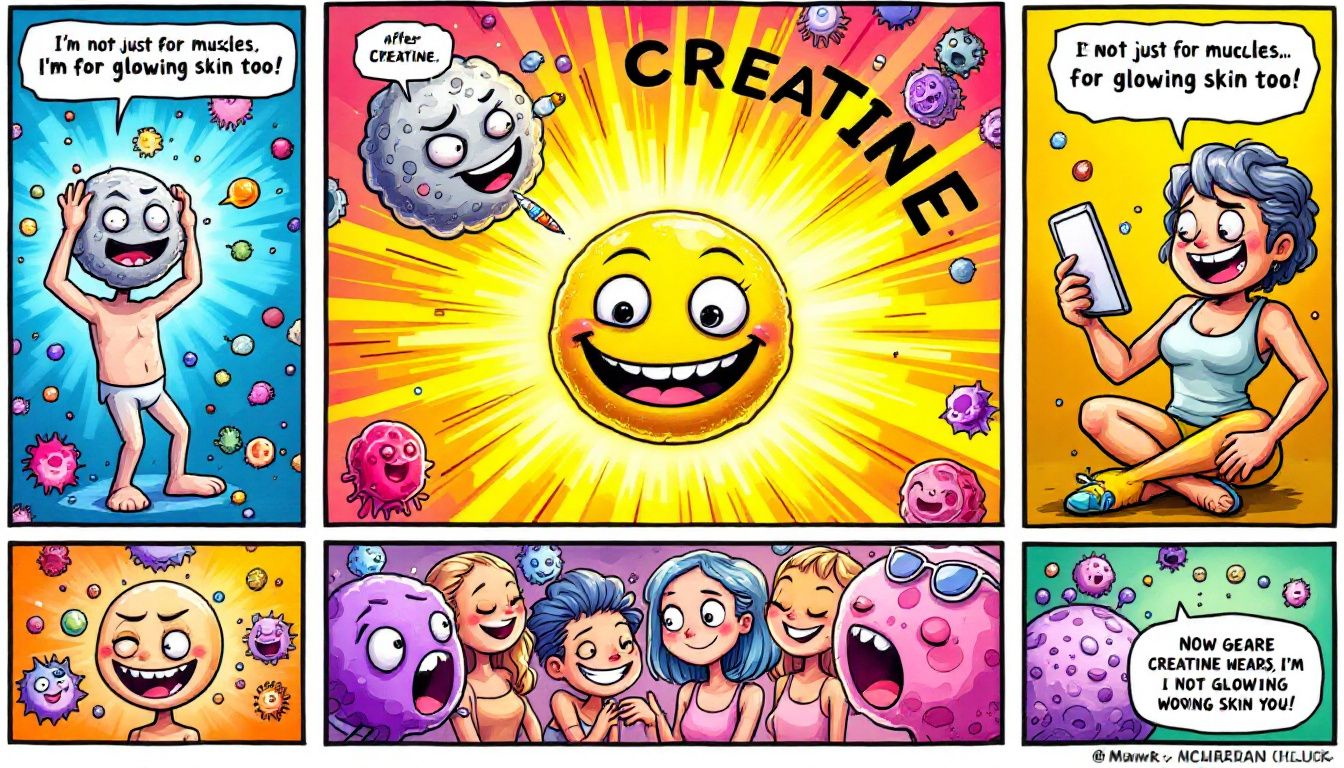

Wondering if creatine causes acne? Despite common concerns, scientific studies show no direct link. However, it’s important to explore the question: does creatine cause acne? In this article, we’ll analyze the evidence and provide tips for maintaining clear skin while using creatine.
Creatine does not directly cause acne; its effects on skin health are primarily influenced by exercise-related factors rather than the supplement itself.
Key side effects of creatine include mild fluid retention and gastrointestinal discomfort, which can be managed through appropriate dosage and timing.
To minimize the risk of acne while using creatine, maintain proper hygiene, including regular washing and using non-comedogenic skincare products.

Creatine is a naturally occurring compound in the body, produced in the liver, kidneys, and pancreas, and primarily stored in skeletal muscles. Approximately 95% of the body's creatine is stored in these muscles, where it plays a crucial role in energy production for muscle performance. Methyl guanidine-acetic acid, the main component of creatine, provides the energy required for muscle contraction and various cellular processes. Acting as a reserve power source, creatine enhances strength and endurance during high-intensity activities.
A person weighing around 154 pounds typically has creatine stores of about 120 mmol/kg. Creatine supplementation can elevate these stores to approximately 160 mmol/kg, boosting energy reserves for muscle growth and performance. Athletes and fitness enthusiasts widely use creatine supplements to enhance physical capabilities and achieve fitness goals more efficiently. Creatine supplements are widely recognized for their potential to improve athletic performance, particularly during high-intensity exercises and resistance training.
Creatine’s primary role in muscles is to provide immediate energy by replenishing adenosine triphosphate (ATP) levels, which are rapidly depleted during intense activities. This rapid ATP regeneration makes creatine indispensable for those aiming to push their limits in the gym or on the field.
When it comes to creatine supplementation, several forms are available, each with its own set of advantages. The most studied and widely used form is creatine monohydrate. This form has been extensively researched and proven to be effective in increasing muscle creatine stores, enhancing athletic performance, and promoting muscle growth. The International Society of Sports Nutrition position stand supports the safety and efficacy of creatine supplementation in exercise, sport, and medicine.
Other forms of creatine include creatine ethyl ester, creatine hydrochloride, and buffered creatine. While these alternatives are marketed for their unique benefits, creatine monohydrate remains the gold standard due to its well-documented efficacy and safety profile.
Whichever form you choose, taking creatine safely and according to recommended guidelines maximizes its benefits and minimizes potential side effects.
Creatine is a naturally occurring amino acid found predominantly in muscle tissue. It plays a pivotal role in energy production, particularly during high-intensity activities. When you take a creatine supplement, it increases the amount of phosphocreatine in your muscles. This phosphocreatine is then converted into adenosine triphosphate (ATP), the primary energy currency of the body. This process allows athletes to perform at higher intensities for longer periods, thereby improving athletic performance and promoting muscle growth. By enhancing the body’s ability to regenerate ATP quickly, creatine supports sustained muscle contraction and overall physical endurance.

One of the most common concerns about creatine supplements is their potential link to acne. However, there is no strong scientific evidence to support the claim that creatine directly leads to acne. While some anecdotal reports suggest a connection, these lack scientific validation and should be taken with a grain of salt.
The primary causes of acne are well-known: excess oil production, bacterial growth, and inflammation. None of these are directly influenced by creatine supplementation. In fact, studies have found no association between creatine use and the development of acne. Differentiating between correlation and causation is crucial when evaluating these claims.
While creatine may not be the culprit, other factors related to exercise and diet could contribute to skin issues. For example, changes in hormonal levels or dietary habits when starting a new supplement regimen might indirectly influence acne. Therefore, consider the broader context of your health and lifestyle when addressing skin concerns.
While creatine supplements themselves do not directly cause acne, several factors associated with their use can contribute to breakouts. Increased sweating and bacteria buildup on the skin due to intense exercise can clog pores, leading to acne. Hormonal fluctuations resulting from changes in muscle mass and body composition may also play a role. Additionally, interactions with other supplements or medications can affect skin health. Lastly, poor skincare and hygiene practices can exacerbate acne issues. It’s essential to consider these factors and adopt a comprehensive approach to skin care while taking creatine.

Like any supplement, creatine can have side effects, although they are generally mild and manageable. Common side effects are fluid retention and diarrhea. Patients may also experience bloating and muscle cramps. It’s important to note that these side effects are typically temporary and can often be mitigated by adjusting the dosage or timing of creatine intake.
One notable side effect is water retention, which can lead to a slight increase in body weight, typically around 2%. This occurs because creatine alters the water content stored in muscle cells. While this can be beneficial for muscle hydration and performance, it may be perceived as bloating or weight gain by some users.
For safe creatine use, choose high-quality products and follow recommended dosing protocols. If adverse effects occur, consult a healthcare professional for proper management and to determine whether to continue using creatine.

Exercise itself does not inherently cause acne, but the conditions created during workouts can contribute to skin issues. Excessive sweating during exercise leads to the accumulation of oil, dirt, and bacteria on the skin, which can clog pores and result in acne. This is why maintaining good hygiene before and after workouts is essential for preventing breakouts.
Hormonal fluctuations induced by intense physical activity and resistance training can also influence acne development. Increased testosterone levels, which can accompany both exercise and creatine supplementation, may indirectly contribute to acne in some individuals. However, these effects vary widely from person to person.
Understanding the connection between exercise and acne helps manage skin health while pursuing fitness goals. Adopting proper skincare routines and addressing potential hormonal changes can minimize the risk of acne flare-ups related to your workout regimen.
Maintaining proper hygiene is key to preventing acne while using creatine supplements. Start by showering immediately after exercise to eliminate sweat and bacteria that might cause acne. Using clean towels to pat away sweat during workouts can also help prevent irritation and reduce the risk of acne flare-ups.
Avoid wearing unwashed workout clothes, as they trap dead skin cells and bacteria, increasing the likelihood of clogged pores and acne. Gently washing your face twice daily and after sweating helps keep your skin clean and less prone to breakouts.
Applying oil-free sunscreen before outdoor exercise can protect your skin from sun damage, which can lead to increased oil production and acne. Additionally, using mild, alcohol-free skincare products can help maintain your skin’s natural balance. Consider topical treatments like retinoids, salicylic acid, and benzoyl peroxide to manage acne effectively.
To maintain healthy skin and minimize the risk of acne breakouts while taking creatine supplements, follow these practical tips:
Regular Cleansing: Wash your face regularly with a gentle cleanser to remove dirt, sweat, and bacteria.
Avoid Touching Your Face: Keep your hands and hair away from your face to prevent transferring oils and bacteria.
Stay Hydrated: Drink plenty of water to flush out toxins and keep your skin hydrated.
Topical Treatments: Consider using a topical creatine cream or serum to improve skin appearance and reduce wrinkles.
Professional Advice: Consult with a healthcare professional or registered dietitian for personalized advice on skin health and nutrition.
Creatine supplements can interact with other supplements and medications, potentially affecting their efficacy and safety. Here are some interactions to be aware of:
Beta-Alanine: Combining creatine with beta-alanine may enhance muscle carnosine levels, improving high-intensity exercise performance.
Branched-Chain Amino Acids (BCAAs): Using creatine alongside BCAAs can promote muscle growth and recovery.
Whey Protein: Taking creatine with whey protein may enhance muscle protein synthesis and growth.
Medications: Always consult with a healthcare professional before combining creatine with any medications, especially those affecting kidney function or blood pressure.

Creatine supplements offer a range of health benefits that make them a popular choice among athletes and fitness enthusiasts. One of the primary advantages is the increase in muscle mass and strength, which can significantly enhance athletic performance and support muscle growth. This creatine supplement is particularly beneficial for resistance training and high-intensity workouts.
Beyond physical performance, creatine supplementation has been linked to improved cognitive function and brain health. Research indicates that creatine supports brain function, particularly in tasks requiring short-term memory and quick thinking, making it valuable for both athletes and individuals seeking to boost mental acuity.
Creatine has been shown to reduce markers of inflammation, benefiting overall health and aiding in chronic disease prevention. It also supports aging muscle by increasing muscle mass and strength, mitigating age-related muscle loss, and improving the quality of life for older adults.
Finally, creatine is naturally produced in the body and can be obtained from dietary sources such as red meat, seafood, and animal milk. This makes creatine a safe and effective supplement when used appropriately and according to recommended guidelines.
When you decide to stop creatine supplementation, it’s important to consider the potential effects on your skin health. As creatine levels in the body decrease, there may be changes in muscle mass and athletic performance. These changes can influence hormone levels, which in turn can affect your skin. To maintain healthy skin, continue following good skincare practices, such as regular cleansing and hydration. Consulting with a healthcare professional or registered dietitian can provide personalized advice on nutrition and skin health after stopping creatine supplementation, ensuring a smooth transition and continued skin health.
Before starting any supplement regimen, including creatine, consult a healthcare professional. This is especially important for individuals with pre-existing health conditions such as kidney disease, high blood pressure, or diabetes. A doctor can determine whether creatine supplementation is safe and appropriate for your specific health needs. Healthgrades, a trusted source for health information, is under the ownership of RVO Health company, enhancing the credibility of the advice.
Creatine supplementation may pose risks for people with certain health issues, making medical advice crucial. For example, individuals with kidney disease should be cautious, as creatine can affect kidney function. Additionally, those taking medications should discuss potential interactions with their healthcare provider.
Consultation is also vital for special populations, such as pregnant or breastfeeding individuals, to ensure the safety of creatine use. Seeking professional guidance allows you to make informed decisions about your supplement regimen and avoid potential health risks.
In summary, while creatine supplements offer numerous health benefits, the concern that they cause acne is largely unfounded. Scientific evidence does not support a direct link between creatine and acne, and other factors such as exercise-induced sweat and hormonal fluctuations are more likely to contribute to skin issues.
By understanding the effects of creatine and adopting proper skincare routines, you can enjoy the benefits of this supplement without compromising your skin health. Always consult a healthcare professional before starting any new supplement, especially if you have pre-existing health conditions.
Creatine may contribute to breakouts by affecting insulin-like growth factor (IGF-1), which can influence sebum production and hormonal balance. This link suggests that while creatine itself isn't the direct cause of acne, it may play a role in its development.
High doses of creatine can lead to serious side effects, including potential kidney damage and a reduction in the body's natural creatine production. It is important to use creatine responsibly to minimize these risks.
Creatine has beneficial effects on skin health, potentially reducing sagging, wrinkles, and sun damage while stimulating collagen production. It may improve skin appearance, especially when applied topically.
Exercise does not directly cause acne; however, sweat and bacteria buildup on the skin during workouts can contribute to acne formation. It is important to maintain proper hygiene post-exercise to minimize this risk.
Consulting a healthcare professional before taking creatine is essential, particularly if you have pre-existing health conditions or are on medications. This ensures your safety and optimal usage.
Share:
Is Creatine Safe for Teens? A Comprehensive Safety Review
Creatine vs Protein: Which is Best for Muscle Growth?